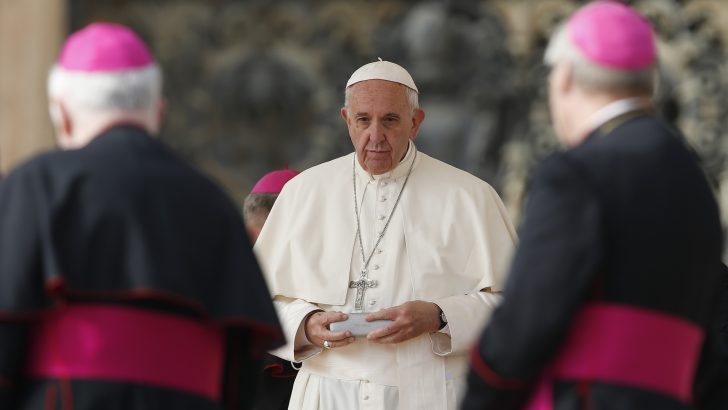Pope Francis wants Catholics to understand that the Church does not exist to condemn people, writes John L. Allen Jr
In 1963, President John F. Kennedy was assassinated, and Americans ever since have pondered what might have been. Fifteen years later, the Catholic Church faced the same question about Pope John Paul I, the ‘Smiling Pope’ who exuded warmth and simplicity, and who died of a heart attack on September 28, 1978, after just 33 days in office.
Americans may still be uncertain, but today Catholics basically have an answer: Had John Paul I lived, he may well have been much like Pope Francis.
The thought occurs in connection with the release of a new interview book with Francis, the first book he’s released as Pope: The Name of God is Mercy, a conversation about his jubilee Holy Year of Mercy in 2016. Published simultaneously in 80 countries, it’s the fruit of an exchange with Italian Vatican writer Andrea Tornielli. Its official release date was Tuesday; copies were provided to news outlets early.
The Vatican marked the book launch with a panel discussion featuring secretary of state Cardinal Pietro Parolin and actor Roberto Benigni of Life is Beautiful movie fame.
There isn’t a great deal in terms of news flashes, but two points are of interest.
Conclusions
One hot-button issue in Catholicism today, which Francis is expected to address in a forthcoming document drawing conclusions from two summits of Catholic bishops, is whether Catholics who divorce and remarry outside the Church ought to be able to receive Communion. (Currently, they’re barred.)
In the book, Francis tells the story of a man who married one of the future Pope’s nieces before his previous marriage had been declared null by a Church court, and thus was excluded from the sacrament. The Pope said the husband went to church every Sunday and said to the priest, “I know you can’t absolve me but I have sinned, please give me a blessing.”
The Pope calls that man “religiously mature.” It could be read as a hint that Francis is inclined to urge understanding, but not necessarily to change existing discipline.
At another point, Francis comments on his famous 2013 soundbite “Who am I to judge?” about gay people.
The pontiff says he was “paraphrasing by heart the Catechism of the Catholic Church,” referring to the official compendium of Church teaching.
“You can advise [gay people] to pray, show goodwill, show them the way, and accompany them along it,” he says, again suggesting that he supports compassion and inclusion, but not a revision of Catholic teaching.
On the whole, the book offers a treatise on Francis’ understanding of mercy.
“The Church does not exist to condemn people, but to bring about an encounter with the visceral love of God’s mercy,” he says, conceding bluntly that Catholicism hasn’t always pulled it off.
“When it comes to bestowing grace, Christ is present,” he says, quoting the 4th-century St Ambrose. “When it comes to exercising rigor, only the ministers of the Church are present, but Christ is absent.”
Francis rejects “a formal adherence to rules and to mental schemes,” insisting that “mercy is the first attribute of God”.
Scanning the brief text, it’s striking that although Francis cites the five other Popes since the opening of the Second Vatican Council in the mid-1960s — St John XXIII, Blessed Paul VI, John Paul I, St John Paul II, and Benedict XVI — the one he alludes to most is John Paul I.
Francis cites “Papa Luciani,” referring to his given name, five times. That’s especially notable given that the other four Popes reigned an average of 13½ years, while John Paul I was in office for barely more than a month.
Despite that brief stay — the 10th shortest papacy ever, and the briefest since Leo XI’s in the early 17th Century — in his day, John Paul I was a sensation.
He came off as exactly what most Catholics pray their leaders will be: warm, compassionate, genuinely happy to be with ordinary people, a man of obvious faith who didn’t wear his piety on his sleeve or take himself too seriously. He pioneered the simplification of the papacy by dropping the royal “we,” declining coronation with the papal tiara, and discontinuing use of the sedia gestatoria, or portable throne.
Sound like anyone you know?
Famously, John Paul I, in one of just a handful of public utterances as Pope, said that God is so merciful as to be “even more” a mother than a father.
“God has such tender love for us, even more tender than the love that a mama has for her children,” he said, quoting the Old Testament prophet Isaiah. “Little children, when they are sick, have one more reason to be loved by their mothers, and so do we: if we are sick with wickedness, if we have gone astray, then we have one more reason to be loved by the Lord.”
Those lines easily could have been spoken by Francis, and in fact, he’s pronounced some version of them countless times.
That’s not to suggest Francis doesn’t have a great deal in common with his other predecessors, too – for instance, St John Paul II created a Feast of Divine Mercy, helping set the stage for Francis’ jubilee — but the bond with John Paul I is remarkable, especially as he tends to be the “forgotten Pope” of the modern era.
A US-based association devoted to John Paul I has petitioned Francis to speed up the process of his beatification, a key step on the road to sainthood, during the Year of Mercy. If the Pontiff’s new book is any indication, that might not be a bad bet.
John L. Allen Jr is Associate Editor of CruxNow.com


 John L. Allen Jr.
John L. Allen Jr.